Internal Quality Assurance Cell
The Internal Quality Assurance Cell (IQAC) is an essential system within the University, designed to promote and sustain a culture of quality at an institutional level. It serves as a key mechanism to ensure continuous improvement, aligning with the diverse needs of all stakeholders. Every Higher Education Institution (HEI) should have a flexible internal quality assurance system, structured to support both planning and monitoring of Quality Assurance (QA) and Quality Enhancement (QE) initiatives.
The IQAC plays a central role in fostering a collaborative and inclusive approach to enhancing and maintaining quality standards across the institution. Led by the Vice Chancellor, the IQAC is composed of 16 members, working together to promote a strong sense of institutional commitment to quality.
Its main focus is on improving overall quality, embedding quality practices within the institution, and developing efficient systems for academic, administrative, and financial operations. Regular training programs are organized for faculty, staff, and students to support these efforts. The IQAC also works to integrate modern teaching, learning, and evaluation methods while ensuring the adequacy and functionality of institutional support structures. Additionally, it hosts workshops and seminars on quality-related topics and is responsible for preparing the University’s Annual Quality Assurance Report (AQAR).
Vision
To evolve, enhance, and sustain an ecosystem that accelerates educational standards and enrich learning processes.
Mission
·
To create
interdisciplinary consultative mechanism.
· To act as a bridge for transferring the unique practices from one discipline to another.
· To facilitate, strengthen and sustain process innovations.
· Evolving quality policy to attain global standards.
To Develop a Quality Culture:
Foster a culture of quality as a prime concern through institutionalizing and
internalizing best practices across all academic and administrative activities.
To
Ensure Continuous Improvement:
Promote consistent efforts toward academic and administrative excellence
through regular monitoring, evaluation, and feedback mechanisms.
To
Promote Teaching-Learning Innovation:
Encourage innovative and learner-centric teaching methods, outcome-based
education, and integration of technology in pedagogy.
To
Facilitate Accreditation and Ranking Preparedness:
Support departments and units in preparing for accreditations (like NAAC, NBA)
and institutional rankings (such as NIRF, GSIRF) by providing strategic
guidance and documentation support.
To
Enhance Student Support Systems:
Strengthen systems related to student mentoring, counseling, skill development,
career guidance, and placement.
To
Establish Effective Feedback Mechanisms:
Collect and
analyze structured feedback from all stakeholders—students, faculty, alumni,
employers—for informed decision-making and continuous quality enhancement.
To
Encourage Research, Innovation, and Extension:
Promote a research-oriented environment, encourage interdisciplinary research,
and support community engagement through extension activities.
To
Strengthen Industry-Academia Linkages:
Foster
collaborations with industries and research organizations to ensure curriculum
relevance and increase student employability.
To
Institutionalize Best Practices:
Identify, document, and share successful initiatives and best practices across
the university for wider adoption.
To
Ensure Transparency and Accountability:
Develop systems to
ensure transparency in governance and academic operations, promoting
participative management and ethical practices.

